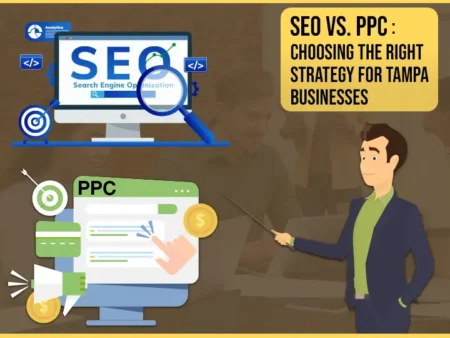
For business owners in Tampa Bay, reaching customers online is no longer an option but a necessity. Two of the most widely used digital marketing strategies are search engine optimization (SEO) and pay-per-click (PPC) advertising. While both approaches can drive traffic and generate leads, they operate in different ways. Companies exploring local SEO or paid campaigns often wonder which method offers better results. The truth is that both strategies can be valuable, and the decision depends on a company’s goals, budget, and timeline.
Understanding Organic SEO
The goal of SEO is to increase a website’s exposure in search results without having to pay for placement. Businesses can raise their rankings over time by improving site structure, optimizing content, and establishing authority through high-quality backlinks.
The main benefit of SEO is its long-term effects. Long after the initial investment in technical advancements and content, a well-optimized website can still draw visitors. Because of this, SEO is particularly alluring to companies looking to build a lasting online presence.
SEO also supports brand credibility. Research has shown that users often place greater trust in organic search results compared to sponsored ones, as high rankings are considered signals of dependability and relevance. Appearing naturally in search results helps reinforce the perception that a business is reputable, making organic visibility an important factor for Tampa companies seeking to build long-term recognition and trust with their audience.
The Benefits of PPC Advertising
Businesses can bid for placement in sponsored search results through PPC advertising, such as Google Ads. For product launches, seasonal promotions, or companies entering competitive markets, these campaigns provide instant visibility, which is particularly beneficial.
Targeting specific audiences is one of the most significant benefits of PPC. Advertisers can customize keywords, locations, demographics, and even the time of day that advertisements appear. PPC can deliver advertisements to local customers looking for dining options the same day for a Tampa-based restaurant advertising a weekend special.
PPC also provides quantifiable results. Businesses can precisely assess their return on investment by tracking impressions, clicks, and conversions with the help of comprehensive performance reports. This data-driven strategy enables quick optimization and adjustments.
The Long-Term Nature of SEO vs. the Speed of PPC
The timeline is where SEO and PPC diverge the most. Because it frequently takes months for results to manifest fully, SEO calls for patience. Ongoing traffic, however, doesn’t require extra cost per click once rankings are set.
PPC, on the other hand, generates traffic instantly but necessitates ongoing expenditure. Visibility vanishes as soon as a campaign ends. Because of this, PPC is ideal for short-term objectives or situations in which companies need immediate results. However, this approach may not be viable as a stand-alone strategy for long-term growth.
Cost Considerations
Many businesses consider the budget when deciding between PPC and SEO. The initial expenses associated with SEO include content creation, technical enhancements, and potentially hiring experts. As organic rankings improve over time, the cost per lead falls.
PPC functions in a different way. Depending on the degree of competition, the cost of each click can vary from a few dollars to much more. Competitive bidding may result in much higher costs for sectors like healthcare and legal services. To maintain profitability, businesses must weigh the cost of each click against the potential lead value.
Finding the Right Balance
Many Tampa businesses discover that combining SEO and PPC yields the best results rather than relying solely on one tactic. While SEO establishes the foundation for long-term visibility and credibility, PPC provides immediate exposure and measurable outcomes.
For instance, a business might invest in SEO to create long-lasting rankings while using PPC to generate leads in the early phases of a campaign. As organic visibility increases, the need for paid advertisements may eventually decline. By striking this balance, companies can increase return on investment while establishing a consistent presence in local search results.
Why Local Context Matters
Adapting strategies to local audiences is particularly beneficial for Tampa businesses. To make sure that businesses show up when local clients search for services, local SEO focuses on optimizing for geographically relevant searches. Additionally, PPC campaigns can be localized to target particular zip codes or neighborhoods. By combining the two strategies, marketing funds are allocated where they will have the most significant effect. For companies in Tampa Bay, the decision between SEO and PPC depends on goals, budget, and timeline. Local SEO builds lasting visibility and credibility, while PPC delivers immediate results and targeted exposure. By understanding the strengths of each method and balancing them effectively, businesses can achieve sustainable growth and maximize return on investment. To learn more about strategies tailored to your business, visit Local SEO Tampa.


